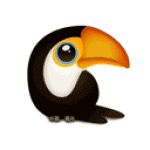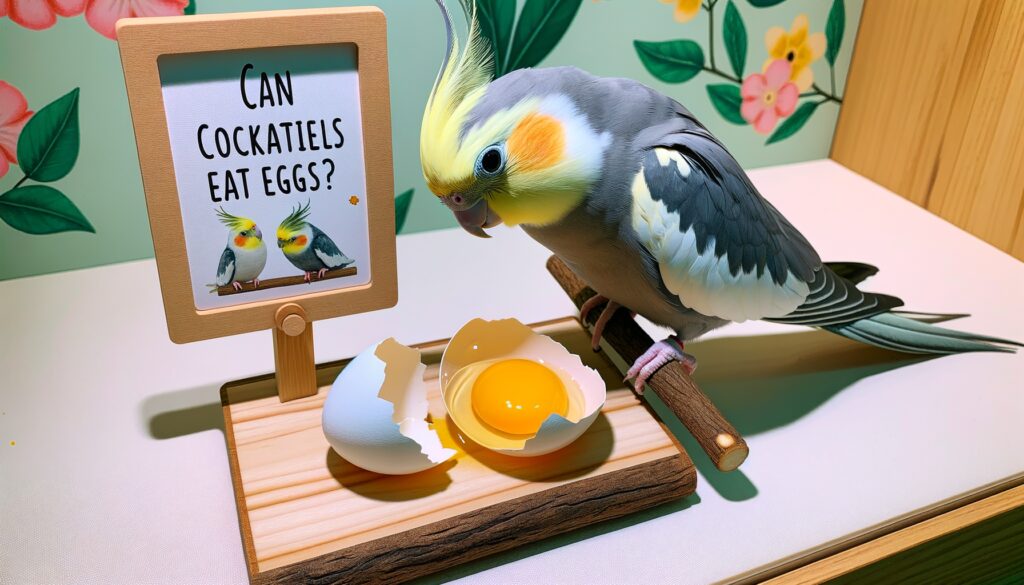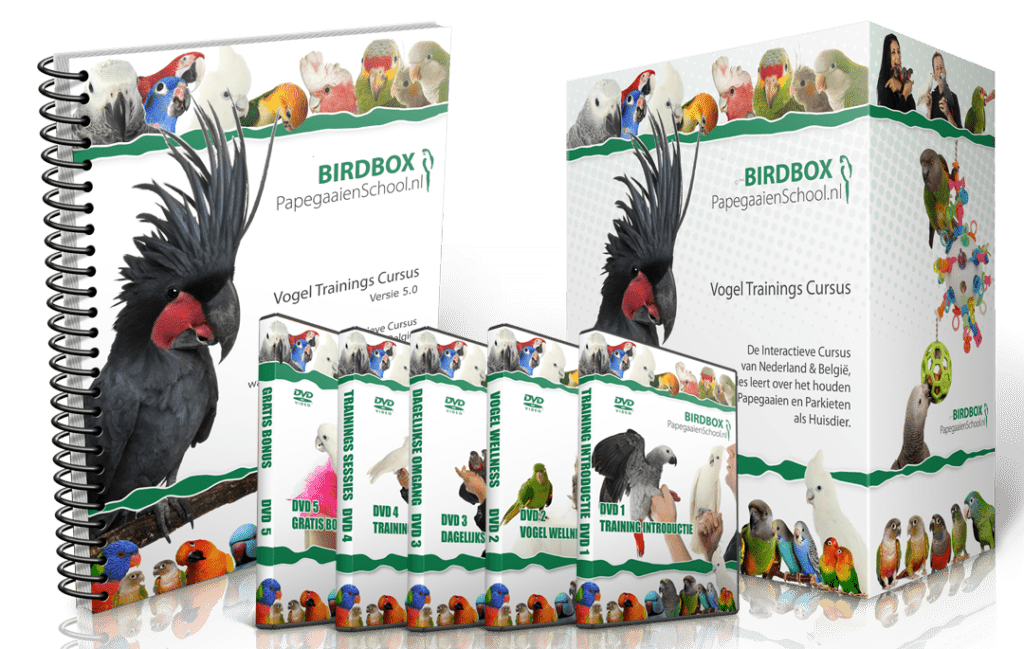Eggs – An Ideal Meal Choice for Your Cockatiel?
Are you thinking of feeding eggs to your cockatiel? Consider these things first:
- Nutritious value: Eggs are a good source of protein and nutrients.
- Variety is key: Don’t make eggs the only food. Provide other options.
- Moderation: 10% of diet max.
- Boiled or scrambled: Raw eggs are a no-no. Cook them first.
- Yolk or egg white?: Both provide different nutrients.
- Quality control: Get eggs from a reliable source.
Keep an eye on how your cockatiel reacts to eggs. Consult an avian vet for the best nutrition for your feathered friend.
Bottom line – cockatiels need to start laying eggs for the nutritional benefits!
Nutritional Value of Eggs for Cockatiels
Incorporating eggs into a cockatiel’s diet can provide numerous nutritional benefits. Eggs are rich in protein, vitamins, minerals, and amino acids, which aid in maintaining the overall health of cockatiels. Here is a breakdown of the nutritional value of eggs for cockatiels:
- – Proteins: Eggs contain high-quality proteins that are essential for a cockatiel’s growth and development. They provide all the necessary amino acids that the bird’s body cannot produce on its own.
- – Calcium: Calcium is vital for the development and maintenance of strong bones, beaks, and feathers. Eggs are a good source of calcium, which aids in preventing egg-binding in female cockatiels during egg-laying season.
- – Vitamins: Eggs contain vitamins A, D, E, and B12, which are essential for a cockatiel’s overall health. Vitamin A aids in maintaining healthy eyesight, while vitamin D helps in the absorption of calcium, and vitamin B12 supports the nervous system and energy metabolism.
- – Fats: Eggs contain healthy fats that provide energy and aid in maintaining a cockatiel’s healthy skin and feathers.
The following table shows the nutritional value of eggs per 100g for cockatiels:
| Nutrient | Quantity per 100g |
|---|---|
| Proteins | 13.3g |
| Calcium | 56mg |
| Vitamin A | 140mcg |
| Vitamin D | 1.1mcg |
| Vitamin E | 0.98mg |
| Vitamin B12 | 1.36mcg |
| Fats | 11.1g |
It is worth noting that overfeeding eggs to a cockatiel can lead to obesity and health issues. It is best to limit egg intake to once or twice a week and incorporate other nutrient-rich foods into their diet.
Pro Tip: Cook and chop the eggs before feeding them to your cockatiel to make digestion easier. Always ensure that eggs are fresh and properly cooked before feeding them to your bird.
Looks like cockatiels are going to have to break a few eggs if they want to up their protein game.
Protein Content in Eggs
When it comes to nutrition, eggs are great for cockatiels! Protein is key, and eggs provide it in abundance. Here’s the breakdown: 6g of protein, 5g of fat, and 0.6g of carbs. Keep in mind, organic or pasture-raised eggs contain more omega-3 fatty acids and are more nutritious than conventional ones. Plus, eggshells are a great calcium source. Don’t forget to cook eggs before feeding them to your bird – raw egg whites have an enzyme called avidin that inhibits biotin absorption. When it comes to nutrition for your feathered friend, cooked eggs are the way to go! And, if eggs are good enough for baby birds, they’re certainly good enough for us!
Vitamins and Minerals Found in Eggs
Eggs are a great source of nutrition for cockatiels. They contain many vitamins and minerals that are vital for their growth and overall health.
The table below outlines the vitamins and minerals found in eggs:
| Nutrient | Amount per 100g |
|---|---|
| Vitamin A | 487 IU |
| Vitamin D | 82 IU |
| Vitamin E | 1.03 mg |
| Thiamin (B1) | 0.148 mg |
| Riboflavin (B2) | 0.425 mg |
| Niacin (B3) | 0.063 mg |
| Pantothenic acid (B5) | 1.108 mg |
| Vitamin B6 | 0.073 mg |
| Folate (B9) | 18 µg |
| Vitamin B12 | 1.11 µg |
| Choline | 295 mg |
| Calcium | 56 mg |
| Iron | 1.75mg |
It’s important to remember that egg yolks are high in fat, so it’s essential to feed them to cockatiels in moderation and balance their diet with other nutritious fruits and veggies.
Furthermore, a study published by the National Center for Biotechnology Information has shown that a vitamin A deficiency can lead to vision problems or even blindness in birds.
Health Benefits of Eggs for Cockatiels
Cockatiels and Eggs: How Eggs Can Improve Your Bird’s Health
Eggs are a nutritious source of protein that can provide health benefits to your cockatiel.
- Protein: Eggs are a high-quality source of protein that can help your bird build and repair tissues.
- Minerals: Eggs contain minerals like calcium and phosphorus that are essential for bone health.
- Vitamins: Eggs are rich in vitamins like vitamin A, which is important for eye health, and vitamin D, which helps your bird absorb calcium.
- Omega-3 Fatty Acids: Eggs contain omega-3 fatty acids that can help reduce inflammation and keep your bird’s feathers healthy.
Moreover, feeding your cockatiel cooked eggs can be a great way to provide them with variety in their diet. Just be sure to avoid feeding raw eggs to your bird as they may contain harmful bacteria.
Additionally, if your cockatiel is laying eggs, providing them with a diet that includes eggs can help them replace the nutrients they lose during the egg-laying process.
A friend of mine once had a cockatiel with a dull and brittle coat. She added cooked eggs to her bird’s diet and noticed a significant improvement in the quality of its feathers over time.
Improvement in Feather Health
Studies have revealed that eggs can benefit the feathers of cockatiels. Reasons for this include:
- Better nutrient intake
- An increase in protein levels
- Eggs are rich in biotin, which is a vitamin that helps with skin and coat health
- Protein helps with the production of feathers during molting
- Eggs can help prevent feather plucking.
Eggs are also beneficial for immunity and brain function. Pet owners can easily add eggs to their pet’s diet.
It is intriguing to know that a small dietary addition can make a difference in animal health. Captain James Cook discovered cockatiels over 250 years ago. In the past, they were consumed by indigenous people due to their abundance and the nutrients they provided.
Eggs in your cockatiel’s diet? Yes please! Your pet’s immune system will be stronger than a germaphobe’s!
Boost in Immune System
The protein in eggs can boost the immunity of cockatiels against illnesses and diseases. This is especially helpful for birds with limited dietary options. Eggs provide amino acids, vitamins and minerals for better health. This can protect against salmonella and E. coli. Eggs are also a great energy source for activity during the day. Including eggs as part of a diverse diet is beneficial for cockatiels.
However, raw egg is not recommended due to bacterial risks. Cooked egg must be boiled or scrambled before giving it to the bird. Feeding eggs to cockatiels carries some risks, but it can make a bird’s diet more interesting!
Risks of Feeding Eggs to Cockatiels
Paragraph 1 – Feeding Eggs to Cockatiels: Risks and Precautions.
Paragraph 2 –
- Eggs have high cholesterol content, which can lead to cardiovascular diseases in cockatiels.
- Cockatiels may develop salmonella infection by ingesting raw eggs or eggs that are contaminated.
- Overfeeding eggs may result in obesity and other health issues in cockatiels.
- The protein in eggs is not the ideal source of nutrition for cockatiels, and a varied diet is essential for their health.
Paragraph 3 –
It is crucial to understand that feeding eggs to cockatiels should not replace a varied and balanced diet. While protein is essential for their health, it is advisable to offer alternative sources, like lean meat or legumes. Some owners feed their birds boiled eggs, but this should only be occasional, and in small amounts to prevent severe health issues.
Paragraph 4 – Pro Tip: If you decide to feed eggs to your cockatiel, make sure to boil them for at least 20 minutes, without adding any salt or seasonings. It is also advisable to consult with a veterinarian to determine the ideal diet for your bird.
Looks like we may need to start advising our feathered friends to watch their cholesterol intake, because the thought of a cockatiel with clogged arteries is just too absurd.
Cholesterol Levels
Cockatiels can be prone to high cholesterol levels, so it is best to avoid eggs as a source of protein. The yolk of an egg is especially high in cholesterol and can cause health issues. A diet with too much fat and cholesterol can lead to obesity and other illnesses.
Therefore, it is important to offer a variety of fresh fruits, vegetables and seeds for your cockatiel’s diet. If you do want to provide eggs, only offer the whites occasionally and not the yolk. As an extra tip, give boiled eggs that still have their shell on, as it will provide additional calcium which helps promote strong bones.
Risk of Salmonella Infection
Cockatiels are at risk of catching Salmonella if they eat eggs. This bacterial infection can harm the bird.
The bacteria can start on the chicken farm; it can spread to other surfaces during transportation and storage until it reaches a kitchen.
So, it’s important to cook the eggs properly before giving them to cockatiels.
Good hygiene is essential when handling eggs. Wash your hands after you touch the shell or egg contents. Keep utensils and food preparation surfaces clean to stop cross-contamination.
Pro Tip: Talk to your avian vet about dietary supplements to boost your pet’s immunity against Salmonella. This way it won’t have to eat food that’s unsafe for it in the wild.
How to Feed Eggs to Cockatiels Safely
Cockatiels, like other birds, can be given eggs as a treat, but it is essential to ensure their safety. The following tips can help feed eggs to cockatiels safely:
- Only offer cooked eggs to prevent the risks of bacterial contamination.
- Provide a small quantity of eggs to avoid causing digestive problems.
- Eggs must not replace a cockatiel’s regular food but only be used as a supplement.
- Do not add salt, spices or butter to the eggs as they can be harmful to your bird’s health.
- Always maintain hygiene and cleanliness while preparing eggs for your cockatiel.
It is important to remember that eggs alone cannot meet all the nutritional requirements of a cockatiel. Therefore, eggs must be offered in moderation and as a supplementary food item. Cockatiels are prone to obesity; thus, excess consumption of eggs could be harmful to their health.
Cockatiel owners throughout history have experimented with a variety of foods for their pets. Nevertheless, when it comes to feeding birds, it is important to make safe and dependable choices while also providing a variety of foods for a balanced diet.
Proper cooking techniques for eggs? More like proper snacking techniques for cockatiels.
Proper Cooking Techniques
Ensure safe egg-eating for your cockatiel by understanding proper cooking techniques. Here’s a guide:
- Source eggs from reliable suppliers for freshness.
- Choose how to cook them, e.g. hard-boil or scramble. Avoid adding any oils or seasonings that may harm your bird.
- Let them cool down before serving. Remove the shell and cut them into small pieces for easier consumption.
- Remember to feed eggs in moderation – they shouldn’t make up a large part of the diet.
Be aware that raw eggs can cause salmonella infection. Cooked eggs are best to reduce the risk.
Mix cooked eggs with other foods, like fruits and vegetables, for a balanced diet.
By following these tips and cooking techniques, you can make sure your cockatiel safely enjoys eggs as part of their diet. But restrict their omelette consumption if they are laying more than a chicken factory!
Limiting Quantity of Eggs
When it comes to eggs for your cockatiel, it’s important to consider their dietary needs and health. You should:
- Introduce eggs little by little, as a tiny part of a balanced diet.
- For adult cockatiels, give eggs once or twice a week.
- Young birds and breeding pairs may need a bit more egg, but no more than 10% of their diet.
- Serve only the egg white for boiled eggs, not the yolk.
- Don’t give your bird any foods with raw or undercooked eggs, as salmonella can be a risk.
- Always provide fresh water with food.
Eggs can give nutrional benefits, but should not be the only food. Provide a variety of other healthy foods like fresh veg and fruit.
Monitor your cockatiel’s behavior and appetite when introducing eggs. Give the right amount so they don’t miss out on the nutritional benefits. And offer alternatives to scrambled eggs for a safe and tasty treat.
Other Foods That Cockatiels Can Eat
Other Foods That are Safe and Nutritious for Cockatiels
Cockatiels are popular pets among bird enthusiasts due to their charming personalities and colorful feathers. Apart from seeds, grains, and fruits, these delightful birds can enjoy a wide variety of other foods to maintain their health and well-being. Here are some of the safe and nutritious foods that can be included in a cockatiel’s diet:
- Vegetables – Fresh and clean greens like spinach, kale, carrots, and broccoli are packed with essential vitamins and minerals that can keep cockatiels healthy.
- Cooked Pasta and Rice – Cooked pasta or brown rice without any seasoning is also a good source of carbohydrates and can be given in small quantities as a treat.
- Boiled Eggs – Soft-boiled eggs are rich in protein and can be given to cockatiels occasionally. This can be an excellent source of protein and an excellent supplement to the daily diet.
- Nuts and Seeds – Cockatiels love nuts and seeds, and they are a great source of healthy fats and minerals. However, they should be given in moderation as they are oily and high in calories.
It is important to note that a balanced diet is vital for their health and well-being. Never feed your cockatiel chocolate, avocado, caffeine, or alcohol as these are toxic to birds.
Pro Tip: Always provide fresh, clean water in a separate dish for your cockatiel along with their food. This will help keep them hydrated and healthy.
Why eat boring spinach when you can give your cockatiel a taste of the exotic with some juicy dragon fruit?
Fruits and Vegetables
Fruits and veggies are must-haves for cockatiels. They give vitamins and nutrients for good health. Consider these options:
- Kale, spinach, collard greens
- Apples, bananas, melons, berries
- Carrots, broccoli, peas, sweet potatoes
- Zucchini, pumpkin
Switch it up with different fruits and veggies. Remember, not all are okay for every bird species.
Dr. Harrison’s Bird Foods website states that cockatiels, like their parrot cousins, need a variety of foods. Don’t just give them seeds. Include a mix of pellets, seeds, and fresh food. Seeds and grains are also great for cockatiels!
Seeds and Grains
Seeds and grains are a must for a cockatiel diet. Nutrients-packed, they provide the energy needed for them to thrive. Millet is a great source of carbs and fiber, plus it’s easy to digest – perfect for young birds or those with digestion problems. Oats offer high levels of proteins and minerals for a healthy body, while quinoa is a gluten-free grain full of amino acids and vitamins to help with cell growth.
Veggies like broccoli, carrots or cucumbers can also be offered in small amounts. Variety is key to a healthy bird diet, so seed-based meals should not be the only option. Introduce fresh fruits and vegetables to add some texture, such as grapes or watermelon – just make sure they aren’t too acidic.
Introduce new foods slowly over weeks so the bird can adjust properly. Abrupt changes could cause digestive issues. Also, check if any food item has pesticides or chemicals before giving it to your pet. Eggs are a no-go, but there are still plenty of yummy treats for your cockatiel!
Conclusion: Can Cockatiels Eat Eggs?
Cockatiels can eat eggs, but it should be in moderation. Eggs are a great source of protein and essential nutrients. But, eggs should not be the main course. It’s crucial to make sure the egg is cooked before giving it to the cockatiel. Raw or undercooked eggs can cause bacterial infections.
Provide a balanced diet with different fruits, vegetables, seeds, and pellets. This variety of food gives them the nutrients and vitamins they need to stay healthy.
Eggshells are a calcium supplement. Crumble them up and give them in their food or place them in a dish.
Watch out for allergies or sensitivities related to eggs. If you see vomiting or diarrhea, stop feeding them eggs right away.
The NCS says good nutrition is essential for a cockatiel’s health. A healthy diet can extend their lifespan and prevent diseases and complications.
Frequently Asked Questions
1. Can cockatiels eat eggs?
Yes, cockatiels can eat eggs as an occasional treat.
2. Should I give my cockatiel raw or cooked eggs?
Cooked eggs are a safer option since they eliminate the risk of salmonella or other harmful bacteria.
3. How often can I give my cockatiels eggs?
Eggs can be given to cockatiels as an occasional treat, once or twice a week is enough.
4. Which part of the egg can I give my cockatiel?
Only give the egg whites to your cockatiel, and avoid giving the yolk as it is high in fat content.
5. Can I replace my cockatiel’s regular food with eggs?
No, eggs should never replace your cockatiel’s regular diet. They should only be given occasionally as a treat.
6. Can too many eggs be harmful to my cockatiel?
Yes, too many eggs can lead to an imbalance in your cockatiel’s diet and cause health issues in the long run, so it’s important to give eggs in moderation.



